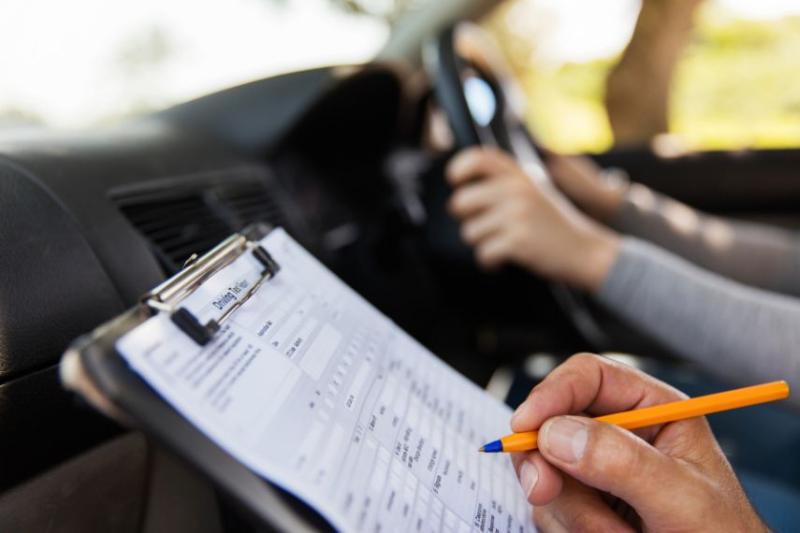
Worried about your driving test?
We’ve put together our comprehensive guide on your theory and practical driving tests, including how to prepare and what to do after.
Driving theory tests
The driving theory test is split into the two sections:
- Multiple-choice questions – you'll have 57 minutes to answer 50 multiple-choice questions
- Hazard perception test – you'll be shown 14 video clips of everyday road scenes that feature hazards, which you need to identify as soon as possible
With both these sections, you’ll be given clear instructions about how the questions work and what’s expected of you.
You can also complete a mock theory test through the Driver & Vehicle Standards Agency (DVSA) website.
On the day you complete your driving theory test, you’ll find out straight away whether you passed or failed – which determines when you can move onto your practical test.
Practical driving tests
There are five parts to the practical test:
- eyesight test
- 'show me, tell me' vehicle safety questions
- general driving ability
- reversing
- independent driving
The test is the same for both manual and automatic cars and takes around 40 minutes.
You can sit your driving test in your own car as long as:
- it's taxed and insured
- there's no tyre damage
- no warning lights are illuminated
As with the theory test, you'll find out there and then if you've passed or failed.
Preparing for your practical driving test
Preparing for your practical test can be nerve-wracking. Here’s some ways you can prepare for your test and some things to remember:
- Last-minute driving lessons – your instructor will usually suggest you have a lesson immediately before the test to make sure you’re comfortable and confident, or to have a ‘mock test’.
- Perfect your manoeuvres – you'll typically be asked to reverse around a corner, turn in the road (a three-point turn), parallel park or bay park, so make sure you feel comfortable with all of these.
- Check your car over – if you’re doing your test in yours or your parent’s car, make sure everything is in working order: for instance, that the headlights and horn are working or that the tyres meet the minimum legal requirements.
- Organise your documents – you'll need to bring your UK provisional driving license, your theory test certificate (dated within two years of your practical test), and proof of car insurance if you’re using your own car.
- Remember your glasses – before you set off, you’ll need to prove you can read a registration number from about 20 metres. So, if you forget your glasses and fail this, it’s an instant failure.
What to do if you fail your driving test
In 2023 the DVSA reported that the top five reasons people failed their driving test were:
- not making effective observations at junctions
- not using mirrors correctly when changing direction
- not moving off safely
- incorrect positioning when turning right at junctions
- not having proper control of the steering
Plus, the most recent pass rate was 48.4% - which means just over half of drivers fail their driving test first time round.
If you fail your driving test, the next steps are to:
- Get back behind the wheel – although it can be a blow to your confidence, it’s important to get back to driving as soon as possible. The longer you go without driving, the more you’ll lose those skills.
- Book another test – booking another test in straight away can give you something to work towards, and depending on waiting lists, it could be a little while anyway.
- Get lots of practise – speak to your driving instructor and they can give you more focussed lessons on the areas you need to improve on. If you can, get back out in a friend or family member’s car for practise too.
Disputing a driving test result
There are some circumstances in which you can dispute a failed driving test result.
This might be because you believe the examiner hasn't conducted the test in line with the regulations or has discriminated against you.
Even if you’re successful, you won't be given a pass certificate and you'll still have to retake your test, but you could get back any out-of-pocket expenses if the complaint rules in your favour.
For instance, the cost of rebooking your test, or the use of your instructor’s car.
Read the DVSA guide on the complaints procedure.
I’ve passed my driving test – what's next?
Congratulations on passing your driving test; there are a few things to consider next.
Getting your full license
You can apply for your full driving licence as soon as you've passed your practical driving test - you should get it within three weeks.
Buying a car
A car will more than likely be one of the most expensive purchases any of us will ever make, so getting it right is important.
We've written about buying your first car, covering things like where to buy from, choosing the right car, and getting it checked over.
Getting car insurance
Insurers calculate the price of your insurance based on the risk you present, and as an inexperienced driver your risk is higher.
The car you choose is naturally an important part of calculating your premium.
You could consider Black Box Insurance: black box insurance is when a small unit is fitted in your car that monitors your driving. If you’re a safe driver, you’ll get a discounted price at renewal.
If you’ll be driving in a family member, friend or partner’s car, read our guide to adding other drivers to a policy.
Taxing your car
When it comes to tax, the cost depends on the kind of car you buy.
Vehicle tax rates are based on engine size, or fuel type and carbon dioxide (CO2) emissions, depending on when the vehicle was registered.
If you're looking for savings anywhere you can get them, there are some vehicles which are tax free.
The current rules state that any new car emitting less than 100g/km CO2 (Carbon Dioxide) are in VED Band A, which means zero spend on tax.
You can pay your road tax annually or monthly, and it can all be arranged online.
MOT and servicing
Every car needs to undergo an MOT test on the third anniversary of its first registration, and then annually after that.
The test is to make sure the car is in roadworthy condition, and checks everything from lights and tyres to windscreen wiper jets and exhaust emissions.
As with road tax, you won't need an MOT if the car is declared off the road.
Annual servicing is not compulsory but is highly recommended.
Your car's warranty could be invalidated if you fail to keep up with the manufacturer's specified servicing schedule.
It's worth noting that your car may need servicing more than once a year if you cover a lot of miles.


